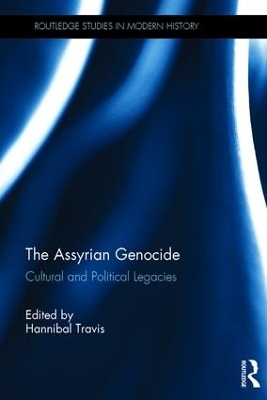
The Assyrian Genocide
Routledge (Verlag)
978-1-138-28405-0 (ISBN)
A key question the book raises is whether the fate of the Assyrians maps onto any of the concepts used within international law and diplomatic history to study genocide and group violence. In this light, the Assyrian genocide stands out as being several times larger, in both absolute terms and relative to the size of the affected group, than the Srebrenica genocide, which is recognized by Turkey as well as by international tribunals and organizations. Including its Armenian and Greek victims, the Ottoman Christian Genocide rivals the Rwandan, Bengali, and Biafran genocides. The book also aims to explore the impact of the genocide period of 1914–1925 on the development or partial unraveling of Assyrian group cohesion, including aspirations to autonomy in the Assyrian areas of northern Iraq, northwestern Iran, and southeastern Turkey. Scholars from around the world have collaborated to approach these research questions by reference to diplomatic and political archives, international legal materials, memoirs, and literary works.
Hannibal Travis publishes work and teaches classes at Florida International University relating to international law, Internet law, and intellectual property. He has also served as Visiting Associate Professor of Law at Villanova University. He graduated magna cum laude from Harvard Law School in 1999, where he served as a teaching assistant in Harvard College. He has published widely on genocide studies and human rights law, including Genocide in the Middle East: The Ottoman Empire, Iraq, and Sudan (2010); "Genocide in Sudan: The Role of Oil Exploration and the Entitlement of the Victims to Reparations," in The Top Ten Global Justice Law Review Articles 2008 (Amos Guiora ed., 2009), 107–162; "On the Original Understanding of the Crime of Genocide," Genocide Studies and Prevention 7 (2012): 30–55; "Did the Armenian Genocide Inspire Hitler?" Middle East Quarterly 20, no. 1, Winter 2013, pp. 27–35; and "Why Was Benghazi 'Saved,' But Sinjar Allowed to Be Lost?: New Failures of Genocide Prevention, 2007–2015," Genocide Studies International 10, no. 2 (2017), https://muse.jhu.edu/journal/690.
List of figures and tables
List of contributors
Acknowledgements
Glossary
List of judicial decisions cited
Table of legislation
1. The Assyrian genocide across history: collective memory, legal theory, and power politics
Hannibal Travis
2. The term Seyfo in historical perspective
Michael Abdalla
3. The atrocities against the Assyrians in 1915: a legal perspective
Sara Demir
4. The Ottoman genocide of the Assyrians in Persia
Anahit Khosroeva
5. Abduction, rape and genocide: Urmia’s Assyrian girls and women
Eden Naby
6. Genocide/Seyfo – and how resistance became a way of life
Sait Çetinoğlu (Abdulmesih BarAbraham, trans.)
7. Lady Surma: the pillar of the Assyrian nation, 1883–1975
Stavros Stavridis
8. The Assyrian delegation in the Paris Peace Conference
Racho Donef
9. The Assyrian "concept of unity" after Seyfo
Aryo Makko
10. Exile or extinction: the Assyrian genocide from 1915 to 2015
Hannibal Travis
11. Epilogue: tombstones and inverted crosses
Nineb Lamassu
Index
| Erscheinungsdatum | 20.09.2017 |
|---|---|
| Reihe/Serie | Routledge Studies in Modern History |
| Zusatzinfo | 5 Tables, black and white; 4 Line drawings, black and white; 6 Halftones, black and white; 15 Illustrations, black and white |
| Verlagsort | London |
| Sprache | englisch |
| Maße | 156 x 234 mm |
| Gewicht | 612 g |
| Themenwelt | Geschichte ► Allgemeine Geschichte ► Neuzeit (bis 1918) |
| Geschichte ► Allgemeine Geschichte ► 1918 bis 1945 | |
| Geisteswissenschaften ► Geschichte ► Regional- / Ländergeschichte | |
| Geschichte ► Teilgebiete der Geschichte ► Wirtschaftsgeschichte | |
| Sozialwissenschaften ► Politik / Verwaltung | |
| ISBN-10 | 1-138-28405-X / 113828405X |
| ISBN-13 | 978-1-138-28405-0 / 9781138284050 |
| Zustand | Neuware |
| Haben Sie eine Frage zum Produkt? |
aus dem Bereich


